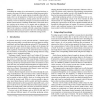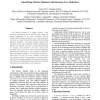528 search results - page 6 / 106 » Causal inference using the algorithmic Markov condition |
WSC
2008
15 years 2 days ago
2008
Emergent behaviors in simulations require explanation, so that valid behaviors can be separated from design or coding errors. Validation of emergent behavior requires accumulation...
BMCBI
2010
14 years 10 months ago
2010
Background: The evolution of high throughput technologies that measure gene expression levels has created a data base for inferring GRNs (a process also known as reverse engineeri...
ECAI
2004
Springer
15 years 3 months ago
2004
Springer
Controlling the sensing of an environment by an agent has been accepted as necessary for effective operation within most practical domains. Usually, however, agents operate in par...
106
click to vote
ICDM
2003
IEEE
15 years 3 months ago
2003
IEEE
The Markov Blanket of a target variable is the minimum conditioning set of variables that makes the target independent of all other variables. Markov Blankets inform feature selec...
ANSS
2006
IEEE
15 years 3 months ago
2006
IEEE
In this paper Hidden Markov Model algorithms are considered as a method for computing conditional properties of continuous-time stochastic simulation models. The goal is to develo...


